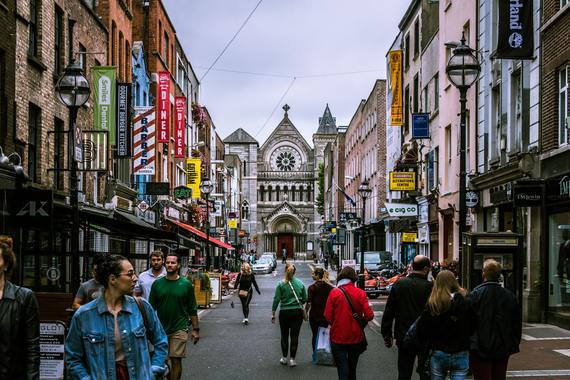
Betting and gambling have long been staples of Irish culture. While horse race betting has typically been the main draw for the people of Ireland, thanks to the boom in the online gambling industry, it is no longer the biggest earner in the pot. Today, the Irish gambling industry as a whole is estimated to be worth around €10 billion and, according to a report in the Independent in 2019, the Irish gambling industry reportedly generates €100 million in tax for the government each year. The industry also employs more than 6,000 people across the country at bookmakers, private clubs, and lottery outlets. However, gambling hasn’t always been a booming industry in this part of the world, as most forms of gambling were illegal until fairly recently.
To get a good picture of what the casino industry is like in Ireland, we must explore the history of gambling laws in the region.
Prohibition and Exclusion
Ireland’s first piece of legislation relating to gambling came four years after the country gained independence from Britain with the Betting Act 1926. However, this act focused primarily on sports betting. Five years later, the act was repealed by the Betting Act 1931, which included prohibitions on commercial betting. This piece of legislation would be updated numerous times in the following years, but it was the Gaming and Lotteries Act 1956 that had the biggest impact on the industry when it was put into action.
The Gaming and Lotteries Act made land-based, commercial casinos illegal in Ireland. Luckily for the industry, some savvy casino owners realised that there was a loophole in the new legislature. By marketing themselves as private clubs, casinos were able to continue bringing in revenue legally while still offering punters the chance to play a host of their favourite casino games including blackjack, poker, video poker, baccarat, slots, and more. As gambling was allowed in a private residence, members of the public could partake in any form of gambling they liked as long as they held a membership to the club and were old enough to legally gamble. Due to the enforcement of this act, most gambling was considered underground in this era.
What this act failed to account for, however, was the already growing online gambling industry, which to this day has remained largely self-regulated. For this reason, there is a huge variety of online casinos in Ireland that offer the public everything from their favourite table games to slots and more.
Positive Changes for the Gambling Industry
In 2013, Ireland started to see a major shift in attitude towards gambling with the passing of the Gambling Control Bill. Instead of prohibition, this bill aimed to regulate what was primarily an underground industry at this stage. Its second function was to protect consumers and ensure fairness in the system. This bill saw all forms of gambling become legal, both at land-based establishments and online, and it also saw casinos being required to be a part of the tax revenue system.
Two years later Ireland’s Betting (Amendment) Act 2015 updated the Betting Act 1931 to make online gambling fully legal, although the act also required all remote betting operators and bookmakers to hold a gambling licence to carry on serving the public. The act also stipulated that both domestic and foreign operators could apply for licensing, a move that further boosted the online market.

Three years later, the Irish Gambling Control Bill 2018 was passed. The purpose of this bill was to monitor and control all types of gambling facilities that offered services and products in Ireland, this included brick-and-mortar establishments as well as online platforms. At the same time as the bill was passed, the Office of Gambling Control Ireland (OGCI) came into being to govern the processes laid out in the bill and to ensure fair treatment of players and protect vulnerable groups, such as children.
What all of these changes in regulations and laws have culminated in is a licensing regime that covers most forms of gambling in Ireland. The primary goal of the legislation is no longer prohibition but protection as it seeks to ensure that Irish gamblers can play in a fair and regulated market and that legal operators are privy to the same benefits as business owners in other industries.
The Rise of Mobile Gambling
While online gambling is still surging in popularity, thanks to mobile phone technology giving the public easy access to a host of mobile applications and websites that allow gaming on the fly, mobile gambling is fast becoming the new favourite way for the Irish to play.
The online gambling market in Ireland is estimated to be worth over €220 million, although an accurate figure is impossible due to current laws. According to some industry experts, almost half of this revenue comes directly from mobile gamblers, and this figure is only expected to grow as more and more casinos start to offer mobile versions of their games.
The Future of Gambling in Ireland
Due to current events that limit the operational capacity of land-based casinos and betting housing, the future of gambling in Ireland is shifting evermore towards digital platforms. Furthermore, as there is currently no regulatory body for the online casino gambling industry in Ireland, which is reportedly worth over a billion Euros, the outlook for the online gambling industry is looking good for both local and international casino operators.
For players, this means an ever-expanding number of online casinos to choose from and more competitive welcome bonuses and other rewards for loyal players, which can only be good news for responsible gamblers.
While the laws around gambling may have shifted over the years, the Irish people’s love of this activity has never wavered, and, with new amendments already in the works to even further legitimise the industry, it seems the gambling industry in Ireland can only continue to expand.










